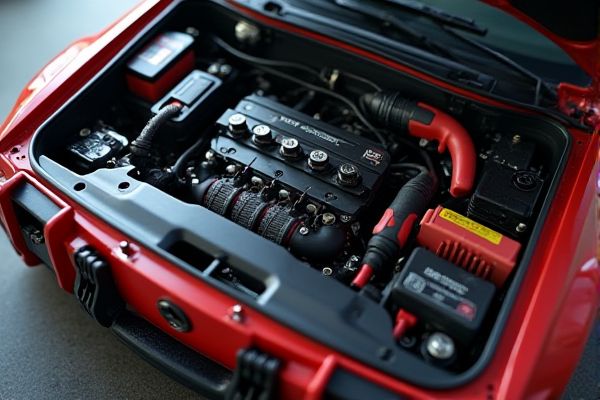
A battery case is specifically designed to protect and organize rechargeable batteries, often featuring compartments that prevent short circuits and damage, while a tool case is built to store and transport various hand or power tools with customizable foam inserts or molded slots. To understand which option best suits Your needs for safety and convenience, read the rest of the article.
Table of Comparison
| Feature | Battery Case | Tool Case |
|---|---|---|
| Primary Use | Protects and charges mobile device batteries | Stores and organizes hand or power tools |
| Material | Plastic or silicone with built-in battery pack | Durable plastic, metal, or fabric |
| Portability | Compact and lightweight, fits phone | Varies from portable boxes to large tool chests |
| Functionality | Extends device battery life, wireless or wired charging | Organizes, protects, and transports multiple tools |
| Capacity | Battery capacity ranges from 2000mAh to 6000mAh+ | Multiple compartments for various tools and accessories |
| Design | Sleek, integrated with charging ports | Robust, with latches, handles, and customizable compartments |
| Cost Range | $20 - $100 depending on brand and capacity | $10 - $300+ depending on size and quality |
| Target Users | Smartphone users needing extra battery life | Professionals, DIYers, and hobbyists managing tools |
Overview: Battery Case vs Tool Case
Battery cases are designed specifically to house and protect rechargeable batteries, often featuring compartments and insulation to prevent damage and extend battery life. Tool cases provide organized storage for hand tools, power tools, and accessories, emphasizing durability and compartmentalization to facilitate easy transport and accessibility. While battery cases prioritize electrical safety and charging efficiency, tool cases focus on protecting tools from impact and environmental factors.
Key Differences Between Battery Cases and Tool Cases
Battery cases primarily store and protect battery packs, ensuring safe transport and optimal battery life, while tool cases are designed to organize and secure various hand or power tools for easy access. Battery cases often feature insulated compartments and shock-absorbing materials to prevent damage or short circuits, unlike tool cases that prioritize compartments and holders tailored to different tools. The key difference lies in their specialized design focus--battery cases center on electrical safety and thermal protection, whereas tool cases emphasize organization and portability for physical tools.
Material and Build Quality Comparison
Battery cases are typically constructed from high-impact, heat-resistant plastics such as ABS or polycarbonate to ensure durability and protection against electrical hazards. Tool cases often utilize reinforced materials like heavy-duty polypropylene or metal alloys for enhanced structural strength and resistance to wear and tear during transport and storage. Both types prioritize robust build quality, but battery cases emphasize insulation and heat dissipation while tool cases focus on impact resistance and load-bearing capacity.
Storage Capacity and Organization
Battery cases offer specialized storage designed to securely hold batteries of various sizes, featuring compartments that prevent movement and protect against damage. Tool cases provide larger, customizable storage spaces with versatile organization options such as trays, dividers, and pockets to accommodate different types of tools and accessories. Choosing the right case depends on optimizing your storage capacity and organization needs for either batteries or tools.
Portability and Weight Considerations
Battery cases are typically designed with lightweight materials and compact dimensions to enhance portability, making them ideal for on-the-go power supply needs. Tool cases often prioritize durability and organization, resulting in heavier and bulkier designs that can limit ease of transport. Choosing between a battery case and a tool case depends on balancing the need for mobility with the requirement for carrying multiple or heavier tools.
Protection and Durability Features
Battery cases are designed with shock-absorbent materials and reinforced corners to protect fragile battery cells from impacts, heat, and moisture, ensuring long-term durability during transport and usage. Tool cases often feature heavy-duty plastic or metal construction with secure latches and padded compartments to prevent tools from shifting, scratching, or rusting, enhancing their lifespan and reliability. Both cases emphasize robust protection, but battery cases prioritize insulation and ventilation, while tool cases focus on structural rigidity and efficient organization.
Compatibility with Tools and Accessories
Battery cases are designed specifically to protect and charge specific power tool batteries, ensuring compatibility with particular battery models and brands. Tool cases, on the other hand, offer versatile storage for a variety of hand tools and power tool accessories, accommodating different shapes and sizes. Choosing between them depends on whether the priority is secure battery protection or broader tool and accessory organization.
Use Case Scenarios: When to Choose Each
Battery cases are ideal for professionals or hobbyists needing portable power solutions on the go, such as during fieldwork or remote job sites where reliable energy storage is crucial. Tool cases excel in organizing, protecting, and transporting physical tools, making them perfect for workshops, construction sites, or DIY projects requiring quick access and tool management. Choose a battery case for power needs and a tool case to keep your equipment systematically arranged and easily accessible.
Cost Efficiency and Value for Money
Battery cases often provide better cost efficiency by combining power storage and portability in a single product, reducing the need for separate chargers or power banks. Tool cases, while typically more durable and specialized for organizing tools, can incur additional expenses when paired with separate battery packs or accessories. Selecting a battery case maximizes value for money by streamlining equipment and minimizing extra purchases.
User Recommendations and Final Verdict
Users seeking portability and convenience prioritize battery cases for their ability to extend device usage without adding significant bulk. Tool cases are recommended for those needing organized storage and protection for multiple instruments, enhancing accessibility during tasks. Overall, the final verdict depends on user needs: opt for battery cases when power on-the-go is essential, and choose tool cases for comprehensive equipment management.
 homyna.com
homyna.com